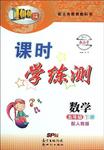题目内容
| |||||||||||||||||||||||||||||||||||||||||||||||||||||||||||||||||||||||||||||||||||||||||||||||||||||||||||||||||||||||||||||||||||||||||||||||||||||||||||||||||||||||||||||||||||||||||||||||||||||||||||||||||||||
解析:
(1) |
人称代词的考察,根据上文跑回奶奶家,应用人称代词宾格her。 |
(2) |
根据奶奶说的“没有圣诞老人?不要相信”。应为“奶奶有点生气”。 |
(3) |
根据上文“奶奶交给我10美元”及下文“买一些有人需要的东西”可知拿的是钱。 |
(4) |
句意理解“那之前我站在哪里几秒钟,考虑着没什么东西,给谁买。” |
(5) |
不定代词的考察 句意为“我想了我所认识的每个人,我的家人,我的朋友,我的邻居”。 everybody“每个人”,nobody “没有人;”somebody“某人” anybody一般用于否定句、疑问句表示“任何人”。 |
(6) |
根据下文“ His mother always wrote a note, telling the teacher that he had a coug”可知Bobbie Decbar是个男孩。 |
(7) |
介词的考察“在……班里”,应用介词in. |
(8) |
根据下文“他妈妈总是给他写假条”,“ Bobbis应是家里比较贫穷,没有外套。”所以应是“几乎不参加聚会。” |
(9) |
连词的考察 此处应为转折关系 |
(10) |
定语从句关系代词的考察 先行词a red warm coat是物,在定语从句中做宾语,应用that. |
(11) |
此处应为在纸条上写道。 |
(12) |
句意理解,“奶奶告诉我圣诞老人从来不想让人知道是他帮助了他们。” |
(13) |
短语辨析 give up放弃;give away分发;put up悬挂,张贴;put off推迟延期。此句应为“我正在帮助圣诞老人挂礼物。” |
(14) |
应为把礼物放在门外 |
(15) |
根据上文“奶奶把车停在街上,我们藏在 Bobbie家附近的树后。” |

 百年学典课时学练测系列答案
百年学典课时学练测系列答案完形填空
Emily
and Peter have lived next door to each other as long as they can remember. When
they were ___(1)___ children, they ___(2)___ play together. They were good
friends, though they sometimes fought over toys. ___(3)___ they grew older, they
seldom(很少) played with each other. Emily preferred to be with girls and
Peter preferred to play with boys. When they were about fifteen years old, they
almost stopped ___(4)___ to each other, not because they disagreed with each
other, ___(5)___ because they belonged to different groups. Emily began to study
French and also enjoyed watching football games. Peter was only interested in
sports.
___(6)___
was football that brought Emily and Peter back together. One day, after Peter
went home, he looked into the window of Emily’s living room and saw ___(7)___
she was watching a football game on TV. He walked up and knocked at the door.
Emily was ___(8)___ to see him, but asked him to come in and they watched the
___(9)___ of the game together. They are good friends again. They ___(10)___
have different ideas about things
sometimes, but they agree with each other that football is the world’s best
game.
(1)
[ ]
|
A.a
little |
B.little |
|
C.a
few |
D.few |
(2)
[ ]
|
A.often |
B.used
to |
|
C.were used to |
D.themselves |
(3)
[ ]
|
A.When |
B.While |
|
C.So |
D.Because |
(4)
[ ]
|
A.speak |
B.spoke |
|
C.to speak |
D.speaking |
(5) [ ]
|
A.and |
B.but |
|
C.that |
D.so |
(6) [ ]
|
A.It |
B.This |
|
C.That |
D.What |
(7)
[ ]
|
A.what |
B. |
|
C.why |
D.if |
(8)
[ ]
|
A.surprise |
B.surprising |
|
C.surprised |
D.a surprise |
(9)
[ ]
|
A.other |
B.next |
|
C.later |
D.rest |
(10)
[ ]
|
A.yet |
B.also |
|
C.still |
D.too |